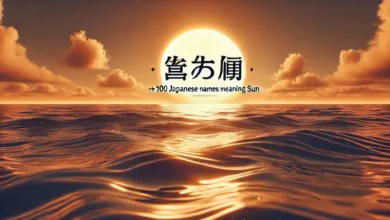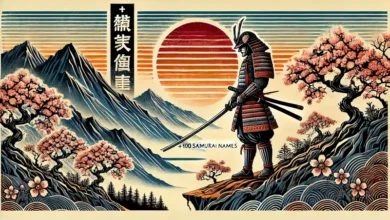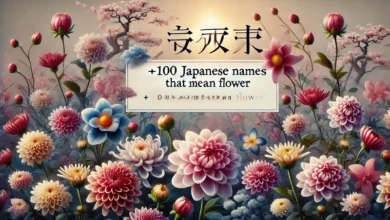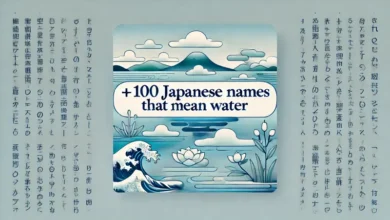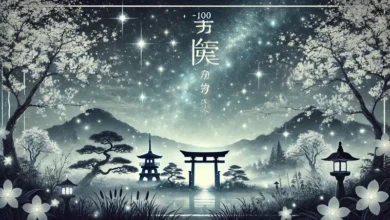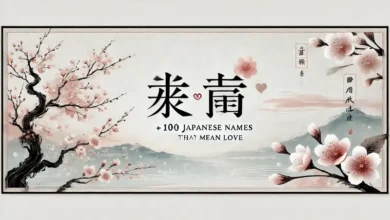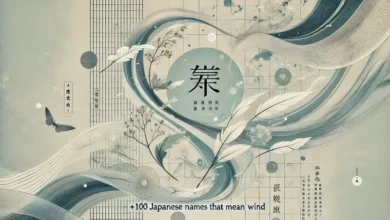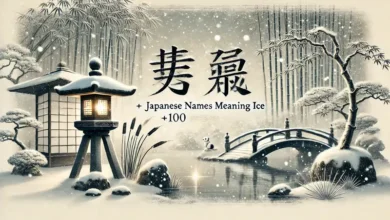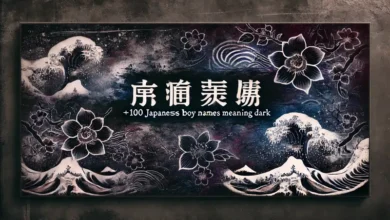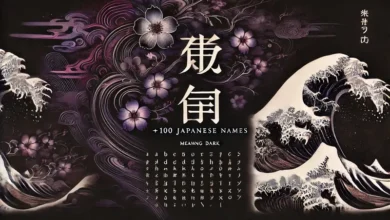Japanese Names
Japanese Names Meaning Moon (+120 Girl, Boy…)
For copy name or description, please click on that!
| Name | Description |
|---|---|
Mio (澪) | “Waterway,” symbolizing the moon’s reflection on water. |
Naoki (直樹) | “Straight tree,” symbolizing steadfast growth under the moonlight. |
Tsukine (月音) – | oon sound. |
Rin (凛) | “Dignified,” suggesting the majestic presence of the moon. |
Kenshin (謙信) | “Modest truth,” representing humility and honesty. |
The moon has captivated cultures worldwide for millennia, inspiring myths, art, and literature. In Japan, its influence extends to the very heart of their language – names. This article delves into the enchanting world of Japanese names that embody the moon’s ethereal beauty, strength, and serenity. We’ll explore the meanings behind these names, uncovering the cultural significance the moon holds in Japan. So, prepare to be illuminated by the soft glow of moonlit monikers!
Japanese Girl Names Meaning Moon
- Tsukiko (月子) – “Child of the moon,” a classic name representing someone born under the moonlight’s grace.
- Aiko (愛光) – “Love light,” symbolizing love as bright and enduring as the moonlight.
- Miyu (美夜) – “Beautiful night,” for a girl as lovely as the moonlit sky.
- Hikari (光輝) – “Shining light,” reflecting the moon’s bright and guiding light.
- Kaguya (輝夜) – Inspired by “The Tale of the Bamboo Cutter,” meaning “shining night.”
- Yuzuki (優月) – “Gentle moon,” for a girl with a soft and gentle nature.
- Rin (凛月) – “Dignified moon,” suggesting a girl with a strong and noble spirit.
- Satsuki (皐月) – “May moon,” referring to the moon of the fifth month, often associated with new beginnings.
- Manami (愛美) – “Loving beauty,” akin to the affection one might feel under a beautiful moon.
- Nozomi (望月) – “Wishing moon,” for a girl full of hopes and dreams.
- Haruka (遥香) – “Distant fragrance,” evoking the mysterious allure of the moon.
- Sayaka (清夜香) – “Clear night fragrance,” for a girl who brings clarity and purity to mind.
- Natsumi (夏美) – “Summer beauty,” reminiscent of clear summer nights under the moon.
- Kanna (寛夏) – “Summer relaxation,” suggesting the peace of summer nights.
- Mitsuki (光月) – “Light of the moon,” symbolizing guidance and illumination.
- Yuna (夢奈) – “Dreamful,” for a girl with dreams as vast as the night sky.
- Ayaka (彩夜香) – “Colorful night fragrance,” for a girl bringing joy and color to the night.
- Eimi (映美) – “Reflecting beauty,” like the moon reflects the sun’s beauty.
- Shiori (詩織) – “Poem weave,” suggesting the poetic beauty of moonlit nights.
- Yuki (雪月) – “Snow moon,” for a girl with a serene and pure spirit.
- Maika (舞香) – “Dance fragrance,” evoking images of dancing under the moonlight.
- Hazuki (葉月) – “Leaf moon,” representing growth and nature under the moon.
- Rika (理香) – “True fragrance,” for a girl whose truth shines like the moon.
- Sumire (純美) – “Pure beauty,” akin to the pristine beauty of the moon.
- Chisato (千里) – “A thousand journeys,” symbolizing the moon’s eternal journey across the sky.
- Himari (陽真里) – “Sun true village,” reflecting the balance between sun and moon.
- Wakana (若菜) – “Young greens,” for a girl fresh and lively as the moonlit night.
- Fumika (文香) – “Literature fragrance,” for a girl with the poetic elegance of the night.
- Nanami (七美) – “Seven beauties,” like the seven phases of the moon.
- Reika (冷香) – “Cold fragrance,” for a girl with a cool and refreshing charm.
- Tamaki (珠希) – “Pearl hope,” representing the moon’s lustrous hope.
- Yurika (友里香) – “Friendly village fragrance,” for a girl who brings people together like the moon’s light.
- Sakura (桜月) – “Cherry blossom moon,” evoking the beauty of moonlit cherry blossoms.
- Minori (実紀) – “Beautiful chronicle,” for a girl whose life is as beautiful as the moon’s tale.
- Kiyomi (清美) – “Pure beauty,” symbolizing the clarity and purity of the moonlight.
- Harumi (春美) – “Spring beauty,” reminiscent of a moonlit spring night.
- Saya (沙耶) – “Sand night,” suggesting the ephemeral beauty of moonlit sand.
- Yui (結唯) – “Tie together,” for a girl who unites people like the moon’s universal appeal.
- Rumi (留美) – “Stay beautiful,” like the timeless beauty of the moon.
- Ami (亜美) – “Second beauty,” reflecting the moon’s role as the night’s beauty after the sun.
- Nao (奈央) – “Straightforward center,” symbolizing the moon’s central role in the night sky.
- Tama (珠真) – “True jewel,” for a girl as precious as the moon.
- Mao (真央) – “True center,” representing the moon’s position at the heart of the night.
- Kotone (琴音) – “Koto sound,” evoking the serene sound of music under the moon.
- Seika (静香) – “Quiet fragrance,” for a girl with a calm and soothing presence.
- Mina (美奈) – “Beautiful Nara,” inspired by the moon over historic Nara.
- Hina (陽菜) – “Sunlight greens,” for a girl who shines brightly, even under the moon.
- Yoko (陽子) – “Sunshine child,” reflecting the moon’s ability to reflect sunlight.
- Rena (麗奈) – “Beautiful Nara,” symbolizing beauty that shines brightly, like the moon over landscapes.
Japanese Boy Names Meaning Moon
- Tsukasa (司月) – “Moon ruler,” for a boy who commands the night.
- Haruto (晴人) – “Clear person,” symbolizing someone clear and bright as the moon.
- Minato (港) – “Harbor,” representing a safe haven in the night, much like the moon.
- Yuito (結人) – “Tie together,” for a boy who brings people together under the moon’s glow.
- Sora (空) – “Sky,” capturing the vastness of the night sky dominated by the moon.
- Ryo (涼月) – “Cool moon,” for a boy with a cool and refreshing personality.
- Kaito (海斗) – “Sea fight,” symbolizing the moon’s control over the tides.
- Yuki (幸生) – “Happiness birth,” for a boy born under a lucky moon.
- Hikaru (光) – “Light,” reflecting the moon’s bright and guiding presence.
- Naoki (直樹) – “Straight tree,” symbolizing steadfast growth under the moonlight.
- Takumi (匠海) – “Artisan sea,” evoking the moon’s creative influence over the sea.
- Masato (真人) – “True person,” for a boy as genuine and reliable as the moon.
- Kazuki (和月) – “Harmony moon,” symbolizing peace and tranquility.
- Rei (冷月) – “Cold moon,” for a boy with a calm and composed demeanor.
- Shin (真夜) – “True night,” representing depth and sincerity.
- Ken (健月) – “Healthy moon,” for a boy with a vibrant spirit.
- Tatsuya (達也) – “To reach,” symbolizing ambition and aspiration towards the moon.
- Kyo (杏月) – “Apricot moon,” suggesting sweetness and brightness.
- Daiki (大輝) – “Great brightness,” akin to the brilliance of the full moon.
- Yuto (勇人) – “Brave person,” for a boy who is courageous like the moon’s bold presence.
- Satoshi (聡月) – “Wise moon,” for a boy with wisdom and insight.
- Hiro (広月) – “Broad moon,” symbolizing a broad-minded individual.
- Issei (一成) – “One success,” representing singular achievement like the unique beauty of the moon.
- Jun (純月) – “Pure moon,” for a boy with purity of heart.
- Kohei (光平) – “Light peace,” reflecting the moon’s calming light.
- Riku (陸月) – “Land moon,” symbolizing the moon’s influence over the land, akin to its effect on the tides.
- Yoshi (良司) – “Good ruler,” for a boy who leads with the grace and benevolence of the moonlight.
- Nobu (信月) – “Trust moon,” representing trustworthiness and reliability.
- Kota (光太) – “Light and thick,” suggesting a boy with a strong and radiant character.
- Makoto (誠月) – “True moon,” symbolizing honesty and integrity.
- Shota (翔太) – “Flying thick,” for a boy with lofty ambitions and dreams as vast as the night sky.
- Hayato (隼人) – “Falcon person,” representing swiftness and precision, with the moon guiding the way.
- Tsubasa (翼) – “Wing,” symbolizing freedom and aspiration, with the moon illuminating the path.
- Kei (圭月) – “Square moon,” for a boy with a strong and balanced nature.
- Ryota (亮太) – “Clear and thick,” representing clarity of purpose and strong will.
- Takuya (卓也) – “Excelling also,” for a boy who stands out, like the moon in the night sky.
- Masaru (勝月) – “Victory moon,” symbolizing triumph and success.
- Yusuke (勇介) – “Brave mediator,” for a boy who courageously bridges gaps, guided by the moon.
- Hiroki (宏輝) – “Wide brightness,” reflecting a generous and illuminating presence.
- Kenshin (謙信) – “Modest truth,” representing humility and honesty.
- Shinji (真二) – “True second,” symbolizing sincerity and authenticity.
- Taiga (大河) – “Great river,” evoking the moon’s guidance over waterways.
- Naoya (直也) – “Straightforward also,” for a boy who is direct and honest, like the clear moon.
- Kyohei (恭平) – “Respectful peace,” representing a peaceful and respectful nature.
- Yudai (勇大) – “Brave and big,” for a boy with a courageous heart and grand aspirations.
- Soma (颯真) – “Swift truth,” symbolizing quick action and genuine intentions.
- Ryusei (流星) – “Shooting star,” for a boy with a dazzling and dynamic personality, complementing the steady moon.
- Tomo (智月) – “Wisdom moon,” representing a boy with deep insight and understanding.
- Kazuma (一真) – “One truth,” symbolizing a singular focus and dedication.
- Haru (春月) – “Spring moon,” for a boy who brings renewal and hope, like the moon heralding spring.
Unisex japanese Names Meaning Moon
- Akari (明里) – “Bright village,” reflecting the moon’s light that illuminates the night.
- Tsukasa (司) – “Director,” symbolizing the moon’s guiding influence over the night.
- Yuki (幸) – “Happiness,” evoking the serene joy the moon brings to the night sky.
- Hikaru (光) – “Light,” representing the moon’s bright and guiding light.
- Sora (空) – “Sky,” capturing the vastness of the night sky dominated by the moon.
- Rin (凛) – “Dignified,” suggesting the majestic presence of the moon.
- Kai (海) – “Sea,” symbolizing the moon’s control over the tides.
- Haru (春) – “Spring,” a season often celebrated under the beauty of the moon.
- Ryo (遼) – “Distant,” reflecting the moon’s far-reaching light.
- Minori (実) – “Harvest,” representing the harvest moon and its importance.
- Asahi (朝日) – “Morning sun,” symbolizing the dawn that follows the moonlit night.
- Noa (乃亜) – “My love,” evoking the affection and tenderness the moon inspires.
- Makoto (誠) – “Truth,” symbolizing the moon’s honest and unwavering presence.
- Nagi (凪) – “Calm,” reflecting the serene tranquility of a moonlit night.
- Sei (星) – “Star,” complementing the moon in the night sky.
- Kyo (杏) – “Apricot,” suggesting the moon’s soft glow.
- Yuma (由真) – “True cause,” symbolizing the moon’s influence on nature and life.
- Toma (冬真) – “Winter truth,” evoking the clarity and purity of the winter moon.
- Aoi (碧) – “Blue,” representing the rare blue moon and its uniqueness.
- Kazu (一) – “One,” symbolizing the moon’s singular beauty in the sky.
- Saku (朔) – “New moon,” representing new beginnings.
- Rei (零) – “Zero,” reflecting the moon’s cycle back to the new moon.
- Mio (澪) – “Waterway,” symbolizing the moon’s reflection on water.
- Kiri (霧) – “Mist,” evoking the mysterious aura of the moon on a misty night.
- Ren (蓮) – “Lotus,” representing purity and rebirth, akin to the moon’s phases.
- Yuma (夢真) – “Dream truth,” symbolizing the moon’s connection to dreams and the subconscious.
- Rio (理緒) – “Logic thread,” representing the moon’s influence on the tides of thought.
- Sena (瀬名) – “Rapids name,” suggesting the moon’s effect on water bodies.
- Kana (佳奈) – “Good name,” evoking the goodness and beauty of the moonlit night.
- Nao (直) – “Straight,” symbolizing the direct and clear light of the moon.
- Luna (ルナ) – “Moon,” directly named after the moon, reflecting its universal beauty.
- Takara (宝) – “Treasure,” representing the moon as a precious gem in the night sky.
- Mika (美香) – “Beautiful fragrance,” evoking the sweet scent of a moonlit garden.
- Aya (彩) – “Color,” symbolizing the moon’s ability to bring out the colors of the night.
- Yuri (由里) – “Reason village,” reflecting the thoughtful contemplation inspired by the moon.
- Kota (幸太) – “Happiness and largeness,” suggesting the vast joy the moon brings.
- Hana (花) – “Flower,” evoking the blossoming under the moonlight.
- Tsubasa (翼) – “Wing,” symbolizing freedom under the moon’s glow.
- Haruka (遥) – “Distant,” reflecting the moon’s distant yet impactful presence.
- Sota (颯太) – “Sudden, great,” symbolizing the impactful appearance of the moon as it rises.
- Yuuki (勇気) – “Courage,” inspired by the moon’s role as a guide and protector through the night.
- Riku (陸) – “Land,” representing the moon’s illumination over the landscapes.
- Mao (真央) – “True center,” symbolizing the moon’s central role in celestial harmony.
- Kana (奏) – “Play music,” evoking the harmonious melody of a moonlit night.
- Shin (心) – “Heart,” reflecting the moon’s influence on emotions and feelings.
- Chika (千香) – “Thousand fragrances,” symbolizing the variety of sensations the moon inspires.
- Aki (秋) – “Autumn,” a season often associated with the beauty of the moon.
- Sumi (澄美) – “Clear beauty,” representing the clarity and purity of the moonlight.
- Kazu (和) – “Harmony,” reflecting the moon’s peaceful presence.
- Toa (透明) – “Transparent,” symbolizing the moon’s transparent beauty and its ability to shine through darkness.
- Rui (涙) – “Tears,” evoking the moon’s connection to emotions and its beauty that can move people to tears.
- Sai (彩) – “Color,” representing the moon’s subtle influence on the colors of the night.
- Yuna (悠那) – “Distant, calm,” symbolizing the serene and calming presence of the moon.
- Asa (朝) – “Morning,” representing the moon’s presence in the early morning sky.
- Kou (光宙) – “Light, universe,” reflecting the moon’s light across the cosmos.
- Nori (法理) – “Law, logic,” symbolizing the moon’s regular cycles and the natural laws it follows.
- Eri (絵里) – “Picture village,” evoking the picturesque scenes created by the moonlight.
- Umi (海見) – “Sea view,” symbolizing the reflection of the moon over the sea.
- Hiro (広朗) – “Wide, bright,” representing the wide and bright illumination of the moon.
- Saku (作) – “Make, create,” inspired by the creative energy and inspiration the moon provides.
Popular Japanese Names Meaning Moon
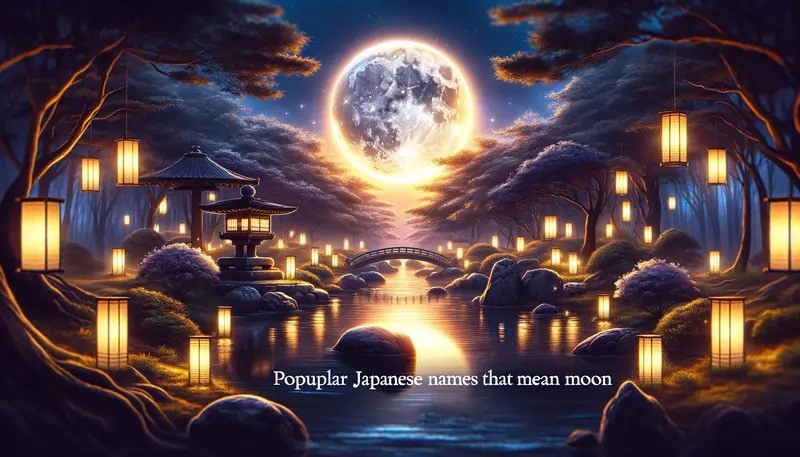
- Akari (明かり) – Light, brightness, often associated with the moon’s light.
- Tsukiko (月子) – Child of the moon.
- Hikari (光) – Light, signifying the moonlight.
- Miyu (美夕) – Beautiful evening, suggestive of moonlit nights.
- Yuzuki (優月) – Gentle moon.
- Aiko (愛光) – Love light, akin to the moon’s gentle light.
- Kanata (彼方) – Beyond, evocative of the distant moon.
- Mitsuki (美月) – Beautiful moon.
- Haruki (春樹) – Spring tree, implying the moon in spring.
- Sora (空) – Sky, where the moon resides.
- Natsumi (夏美) – Beautiful summer, reminiscent of summer moon.
- Sayaka (清香) – Clear and fragrant, like the air under the moon.
- Tsukasa (司) – Director, one who commands, inspired by the moon’s presence.
- Yuki (幸) – Happiness or snow, reflecting the moon’s light on snow.
- Kiyomi (清見) – Pure view, as clear as the moon.
- Rikka (六花) – Six flowers, a poetic image under the moon.
- Nozomi (望) – Hope, like the constant moon.
- Rei (麗) – Lovely, as the moon adorns the night.
- Mahina (真日菜) – True sun greens, from Hawaiian influence, moon.
- Shinju (真珠) – Pearl, glowing like the moon.
- Suzume (雀) – Sparrow, symbolizing the moon indirectly through nocturnal imagery.
- Kaito (海斗) – Sea and big dipper, navigating by the moon.
- Mangetsu (満月) – Full moon.
- Tsukimi (月見) – Moon viewing.
- Luna (ルナ) – Moon, from Latin but used in Japanese contexts.
- Yoru (夜) – Night, when the moon is visible.
- Akemi (明美) – Bright beauty, like the moon’s.
- Moe (萌) – Sprouting, as in the beginning phases of the moon.
- Tsukihiko (月彦) – Moon prince.
- Yuna (由奈) – Reason + greens, implying a peaceful moonlit night.
- Kaguya (かぐや) – Radiant night, from The Tale of the Bamboo Cutter (princess from the moon).
- Chisato (千里) – A thousand villages, under the same moon.
- Tsukino (月野) – Field of the moon.
- Ayaka (彩夏) – Colorful summer, like the moon’s varying colors.
- Momoka (桃花) – Peach blossom, blooming under the moon.
- Tsukine (月音) – Moon sound.
- Hibiki (響) – Echo, reminiscent of the moon’s reflection.
- Minako (美奈子) – Beautiful child of the fields, under the moon.
- Yukari (由香里) – Affinity, as people gather to watch the moon.
- Kakeru (駆ける) – Running, like the motion of the moon across the sky.
- Rina (里奈) – Village greens, peaceful as the moonlit night.
- Satsuki (皐月) – May, when the moon is often celebrated in Japan.
- Aya (彩) – Color, like the varied shades of the moon.
- Hina (陽菜) – Sun greens, complementing the moon.
- Masaru (勝) – Victory, inspired by the moon’s enduring presence.
- Narumi (鳴海) – Thundering sea, under the moonlight.
- Shizuku (雫) – Droplet, sparkling like the moon on water.
- Tamaki (環) – Ring, like the halo around the moon.
- Yayoi (弥生) – March, a month that often celebrates the coming spring and the beauty of the moon.
- Yuina (結菜) – Binding greens, under the unifying light of the moon.
- Tsukumo (九十九) – Ninety-nine, symbolizing the near completeness, just as the full moon almost perfectly completes the circle.
- Kazuki (和月) – Harmonious moon, representing peace and tranquility.
- Mayumi (真弓) – True bow, reminiscent of the crescent moon’s shape.
- Rin (凛) – Dignified, as the moon commands the night sky.
- Hotaru (蛍) – Firefly, whose light dances like moonbeams.
- Seira (星羅) – Starry sky, where the moon is the crown jewel.
- Akira (明) – Bright, clear, symbolizing the moon’s clarity against the night.
- Mei (明) – Brightness, reflecting the light of the moon.
- Sorami (空美) – Beautiful sky, under which the moon shines brightly.
- Yumika (夢香) – Dream fragrance, evoking the ethereal and mesmerizing essence of the moonlit night, as if the moon itself is weaving dreams through its gentle light.
